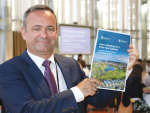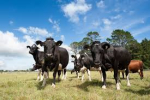National's agriculture spokesman David Bennett says the Government should take note of new research confirming the New Zealand dairy industry’s low carbon emission profile.
The research, commissioned by DairyNZ and produced by state-owned AgResearch, shows NZ dairy farmers have the world’s lowest carbon footprint – at half the emissions of other international producers.
The report says NZ retains its outstanding position in low-emission dairy milk production, with an on-farm carbon footprint 46% less than the average of 18 countries studied.
The research analysed 55% of global milk production, including major milk producing countries and was peer-reviewed by an international specialist in Ireland.
Bennett says the research needs to be part of future government policy and decision making.
“The Government should celebrate, rather than decry, the excellent work our dairy farmers do, and work with them to maintain this world leadership,” Bennett says.
“I congratulate our dairy farmers for their excellence and expect this to be recognised in future Government policy decisions.”
DairyNZ chief executive Dr Tim Mackle says the research plays a key part in understanding how New Zealand dairy farms stack up and informs how farmers can be even more efficient.
“New Zealand’s dairy sector is committed to remaining the most efficient producer of low emissions milk in the world. Our focus as a sector is sustaining our success as consumers and communities increasingly seek sustainably produced food,” says Mackle.
“New Zealand dairy farmers’ hard work and investment over decades has contributed to this world-leading status. Our grass-based, outdoor grazing system is unique globally and is critical to our success.”
“We need Government support as we adopt new knowledge, practices and technology,” he says.
The research compares carbon dioxide equivalent (CO2e) emissions per kilogram of milk (fat and protein corrected milk).
Dr Andre Mazzetto, who co-led the research, says New Zealand is known internationally for its low carbon footprint and the research supports this.
“There is still potential to improve and achieve lower emissions as other countries also advance their dairy sectors.”











